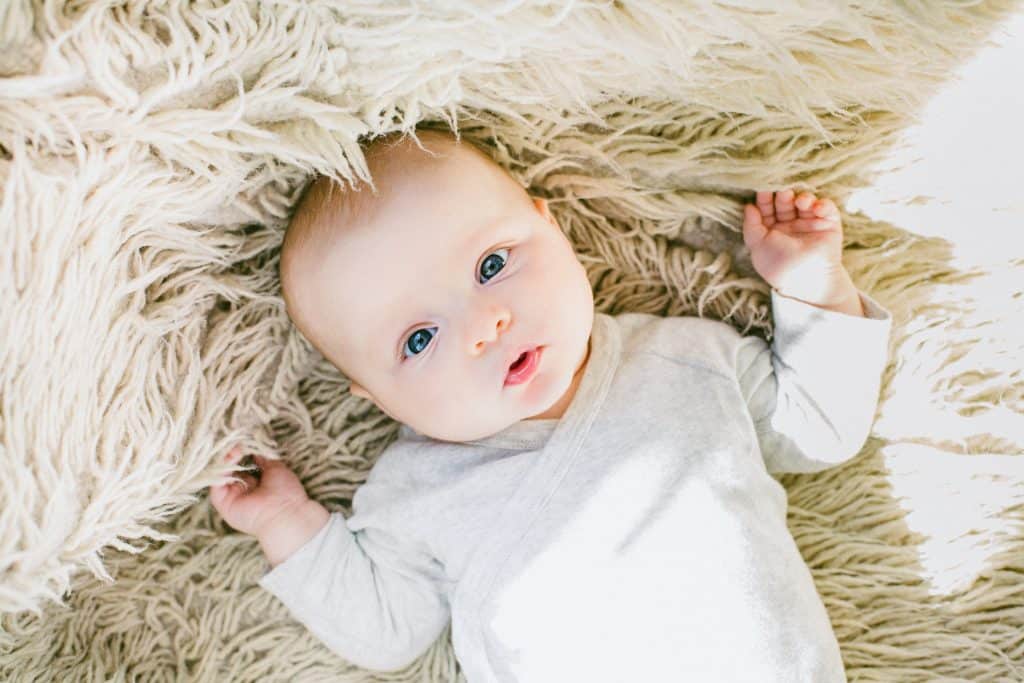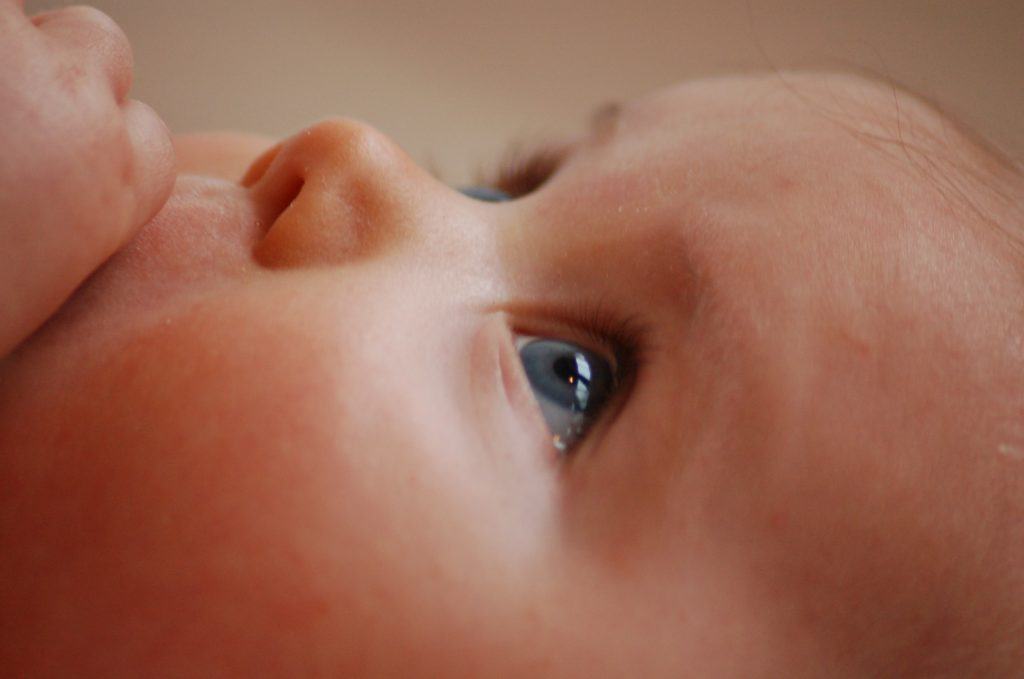
When we’re getting close to our due date, our focus is often entirely on the labor and delivery itself.
It’s rare for us to spend much time thinking about the first hours and days afterward.
Yet it’s important to know about those first few days and what to expect from your newborn baby during that time.
Immediately after the birth of your baby, the chances are that you’re simply going to stare adoringly at him or her taking in every detail of who they are.
You’ll memorize how they smell, how they yawn, the sound of their cry, how they scrunch up their eyes, and the little marks on their skin which make them a beautiful blend and part of you.
But it’s not all love and heart flutters, there are a few practical things you need to know about to help you prepare for the postnatal period with your baby.
These are ten things you should expect from your newborn in the first 48 hours or so.
1. Immediate Bonding
The first few minutes, hours, and days after the birth of your baby are the most important in terms of bonding.
During this time you need to make your baby feel as loved as they surely are, and the best way to do that is by eye contact and skin-to-skin contact.
Eye contact is easily explained; by making eye contact with your baby, smiling, stroking their skin, and making cooing noises, you’re showing them love, attention, and adoration, which will bond the two of you together.
Skin-to-skin is holding your baby close to you against bare skin as often as possible.
This will calm them by allowing them to feel your heartbeat just as they did while they were inside the womb.
It also gives your baby a chance to really get to know your smell and you to know theirs.
When your baby becomes upset or cries a lot, holding them to your chest could be just enough to settle them, and it’s also a very effective way to bond.
In addition, don’t be surprised by that ‘take your breath away’ feeling of total love and protection you have for that tiny human being the very second you set eyes on them.
What a wonderful feeling!
2. Your Baby’s Eyesight
When your baby is first born they can see but they aren’t able to focus well just yet.
A newborn’s eyesight really only begins to focus sharply after a few months.
This will be a slow process from the first day moving through into the first few months.
Yet eye contact with them is still important.
They focus best at a distance of 7- 8 inches away from their face.
Just the spot where you are when holding them in the crook of your arm.
You might notice that your baby’s eyes aren’t very coordinated and move away from each other.
It might look a bit weird but this isn’t something to worry about in a newborn.
The babies eye muscles haven’t had a chance to strengthen yet so it’s very normal.

3. A Desire to be Close
You might notice that you have a baby that only wants to be on you in the first days and weeks, and this is totally normal.
Birth can be quite a traumatic event for a baby.
The world is completely different from the one they’ve been used to all safe and warm inside your uterus.
So it’s completely natural that he or she needs reassurance via closeness from their mother or father.
Often a baby’s favorite position to be is laying against you tummy down on your chest.
This is instinctual and helps them to regulate their temperature and heart rate, take in your reassuring smell and stay warm.
Some new parents worry about picking up their baby too much, holding them too much, cuddling them too much, in the mistaken belief this can cause “bad habits”.
But this old fashioned idea should go straight out of the window.
Making your baby feel safe, reassured, and loved, is more important than anything else.
4. Feeding
Immediately after a normal vaginal birth babies have an instinct to crawl to the breast and start to suckle – it’s called the breast crawl.
If baby is placed on you however, they won’t need to crawl.
After meeting your baby you will be encouraged to feed them within the first hour after giving birth.
For the first few days, your baby will be getting your nourishing colostrum which is packed with antibodies.
In the first 24-48 hours, your baby may want to feed very frequently. Because babies stomachs are so tiny most newborns like to eat every 1 – 2.5 hours in the first few days.
He or she may also be tired after their journey into the world and sleep for hours too and you may be worried that they are not feeding enough.
As long as baby has no health concerns such as jaundice you can follow their lead.
They will be sure to let you know when they need feeding.

5. Jaundice
Jaundice is something to watch for in the first few days of life.
Jaundice can make your baby’s skin or eyes (the whites of the eyes) look yellowish.
When a baby develops jaundice in the first day of life this is a more serious situation which needs treatment.
However, if you notice mild jaundice around day three, this is something which should clear up on its own within ten days or so.
Of course, you can talk to your midwife or doctor if you’re unsure or worried.
Jaundice is more likely to develop if you had an assisted delivery, baby was preterm or you’re breastfeeding.
It is caused by the baby’s immature liver not being able to break down so many old red blood cells at once.
It’s very common and usually nothing to be concerned about but it is something to be aware of and to ask for advice if you’re not sure.
6. Umbilical Cord
Without a doubt, one of the most unusual things about a newborn baby is the umbilical cord stump.
It’s normal to be worried about pulling it or knocking it and hurting your baby.
Knowing how to look after it properly and clean it isn’t nearly as difficult as you might think.
Shortly after birth your baby’s umbilical cord will normally be clamped and clipped.
This clip will be placed very close to what will become their belly button.
You can choose for your birth partner to cut the cord, or your midwife or doctor can do it for you.
A small part is left behind with the clip still attached to it.
You don’t need to do anything to the umbilical stump other than keeping it clean and dry until it falls off itself which usually happens within seven days.
It will go dry and crusty but it shouldn’t bleed, have a discharge, or look red.
If any of these signs are present, check with your midwife or doctor to see if any treatment is needed.
7. Poop/Meconium
You prepared yourself for the reality of changing dirty nappies, but nothing can really prepare you for the sight of your baby’s first poop.
No, this is not a normal poop – this is a green and black, sticky tarry poop that looks very strange.
It may leave you wondering whether your baby is actually human but this meconium is totally normal.
This first few poops are totally different from the ones that follow and is a result of the various different amniotic fluids and substances your baby has swallowed while in the womb resulting in the formation of something called meconium.
This is a secretion of the intestines that consists of unpleasant things like bile and debris.
This starts to form around 16 weeks of gestation.
Those first very odd looking poops your baby had is the meconium being eliminated.
If you’re wondering why it doesn’t smell, it’s because meconium is sterile.
Over the coming days, you’ll notice that your baby’s poop will begin to slowly change color and will eventually become a yellow color which is normal for babies.
8. Breasts & Genitals
A newborn baby’s genitals can seem quite swollen for a short while after birth.
A girl’s breasts can be swollen and can also ooze a little milk.
It’s quite common for a boy’s breasts to do the same.
This should settle down over the coming weeks and everything should return to normal.
It’s also quite possible that your baby girl will bleed a little from the vagina, or even have a tiny amount of cloudy discharge.
These symptoms are caused by hormonal changes during the birth with hormones passing between you and your baby.
Don’t worry about this as it’s completely normal.
You might also notice that your little boy’s testicles don’t appear to be descended.
This is because testicles actually develop inside the body and they can sometimes take a little time to drop down into the scrotum.

9. Being Unsettled and Crying
Crying is the way your baby lets you know something feels wrong or that they need something.
In the first days, it’s often the result of a ‘what-the-hell-is-happening-to-me’ feeling that your baby is going through.
One minute they’re in the womb, warm and comfortable, and the next they’re outside in this bright world surrounded by loud sounds, bright lights, busy colors and people cooing at them.
You’d be unsettled too!
Most new parents agree that the second night can be a little difficult because this is when reality seems to hit home with your baby.
You will find that they probably cry more and no matter what you do they don’t seem to settle.
You will not get the best night’s sleep.
Give them lots of cuddles, hold them against your chest to allow them to hear your heartbeat, and feed, feed, feed.
Baby will be suckling A LOT to stimulate your milk coming in.
Your baby will be getting colostrum so don’t worry that they aren’t getting enough to eat.
Simply ride out the second night as best you can.
Once your milk comes in your baby should chill out a little.
10. Sleep & Awake Time
Being born is tiring!
Your baby will most likely sleep in chunks of one to four hours at a time, only waking to eat.
They may even sleep for a longer 4-6 hour stretch within the first 48 hours.
Babies will usually feed and then go to sleep straight away with very little awake time so don’t expect much in the way of playing and cooing in the first few days.
They may protest if you have to disturb their sleep to change their nappy.
Making their tiny bottom cold and wet when they’re trying to sleep is not welcome.
When they are awake your newborn will be happy to have a cuddle and gaze into your eyes.
Getting to know you is just as important for them as it is for you.
All of this may seem overwhelming to think about before the birth of your new baby, but rest assured, once that maternal instinct kicks in, most things will come instinctually.
Those first 48 hours with your newborn are so special and precious.
Enjoy every moment of them Momma.
Sources:
- https://www.lactation-911.com/breastfeeding-the-first-48-hours/
- https://www.pnmag.com/mom-baby/postpartum/the-first-72-hours/
- https://www.webmd.com/parenting/baby/newborn-vision
- https://medlineplus.gov/ency/article/001559.htm
- https://www.parents.com/baby/health/other-issues/baby-genital-care/
- https://www.medicalnewstoday.com/articles/322565.php
